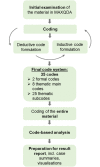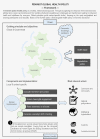Towards a Feminist Global Health Policy: Power, intersectionality, and transformation
- PMID: 38451969
- PMCID: PMC10919653
- DOI: 10.1371/journal.pgph.0002959
Towards a Feminist Global Health Policy: Power, intersectionality, and transformation
Abstract
In the realm of global health policy, the intricacies of power dynamics and intersectionality have become increasingly evident. Structurally embedded power hierarchies constitute a significant concern in achieving health for all and demand transformational change. Adopting intersectional feminist approaches potentially mitigates health inequities through more inclusive and responsive health policies. While feminist approaches to foreign and development policies are receiving increasing attention, they are not accorded the importance they deserve in global health policy. This article presents a framework for a Feminist Global Health Policy (FGHP), outlines the objectives and underlying principles and identifies the actors responsible for its meaningful implementation. Recognising that power hierarchies and societal contexts inherently shape research, the proposed framework was developed via a participatory research approach that aligns with feminist principles. Three independent online focus groups were conducted between August and September 2022 with 11 participants affiliated to the global-academic or local-activist level and covering all WHO regions. The qualitative content analysis revealed that a FGHP must be centred on considerations of intersectionality, power and knowledge paradigms to present meaningful alternatives to the current structures. By balancing guiding principles with sensitivity for context-specific adaptations, the framework is designed to be applicable locally and globally, whilst its adoption is intended to advance health equity and reproductive justice, with communities and policymakers identified as the main actors. This study underscores the importance of dismantling power structures by fostering intersectional and participatory approaches for a more equitable global health landscape. The FGHP framework is intended to initiate debate among global health practitioners, policymakers, researchers and communities. Whilst an undeniably intricate and time-consuming process, continuous and collaborative work towards health equity is imperative to translate this vision into practice.
Copyright: © 2024 Eger et al. This is an open access article distributed under the terms of the Creative Commons Attribution License, which permits unrestricted use, distribution, and reproduction in any medium, provided the original author and source are credited.
Conflict of interest statement
The authors have declared that no competing interests exist.
Figures
References
-
- United Nations. Transforming our world: the 2030 Agenda for Sustainable Development: Resolution adopted by the General Assembly on 25 September 2015, Seventieth session Agenda items 15 and 116, A/RES/70/1. 2015.
-
- Solar O, Irwin A. A conceptual framework for action on the social determinants of health. Social Determinants of Health Discussion Paper 2 (Policy and Practice). Geneva; 2010.
Grants and funding
LinkOut - more resources
Full Text Sources



